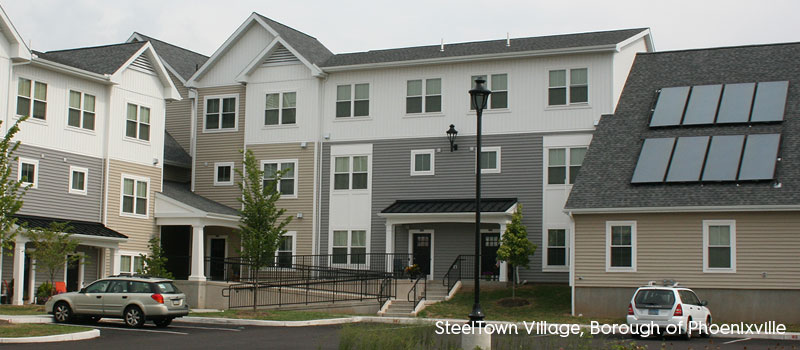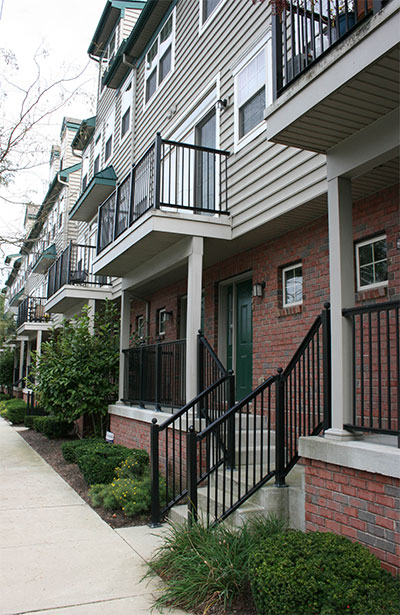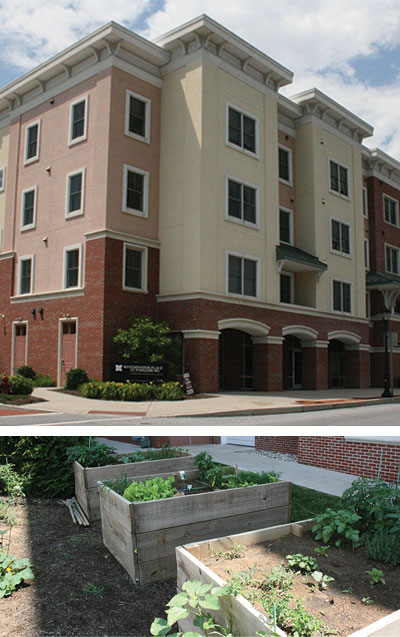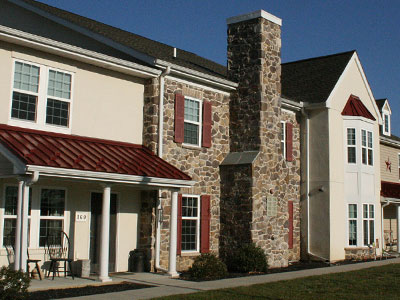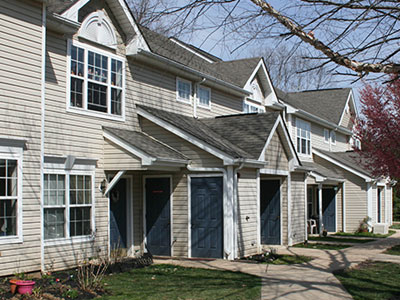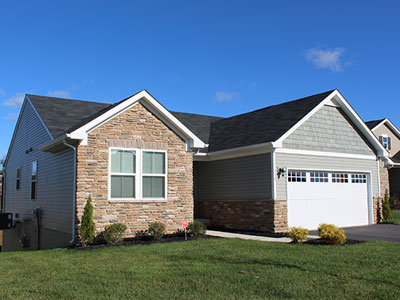Green Street Mews, located in Downingtown Borough, exemplifies the possibilities for turning outdated industrial sites into attractive new homes that are within walking distance to amenities, restaurants, and the train.
How it Works
Chester County's existing housing stock is not currently meeting the changing needs of the growing population in respect to affordability. There are not enough units to meet the general demand, particularly for projections of population growth, and the existing homes may not match up to resident needs due to size, price, design, location, or accessibility. Chester County trends demonstrating the need for more affordably-priced housing include:
- A growing senior population with fixed incomes;
- A growing number of single person households;
- Adult children of county residents having difficulty affording to live in the county;
- Rental and housing costs increasing at a disproportionately higher rate than incomes; and
- Businesses having trouble attracting and retaining workers due to the price of housing.
Addressing the challenge of housing affordability will require municipalities to utilize a combination of tools. This resource details potential tools that can be implemented to encourage affordably-priced homes in Chester County. Additional tools (Housing Diversity, Housing Rehabilitation, Affordable Housing Bonuses, Accessory Dwelling Units, Farmworker Housing, Mini Homes, and Mobile Home Parks) are addressed in more detail in Housing Tools. Implementation of these tools calls for supportive policy, innovative design and regulation, and partnerships between community stakeholders.
Benefits
Aging Population Support
Enables seniors to afford to age-in-community and not be overly burdened by home costs.
Economic Development
Allows local businesses to remain competitive by providing housing choices for employees.
Affordability
Ensures housing choices for Chester County residents at all income levels.
Land Preservation
Developing smaller, more compact units decreases housing costs and promotes compact development over sprawl.
Fair Share
Developing and maintaining affordably-priced housing ensures compliance with Pennsylvania codes. The Pennsylvania Municipalities Planning Code (MPC) lists as one of the required purposes of zoning the need to provide for various types of dwelling units, including single family, two family, and a reasonable range of multiple family housing (Section 604.4). Pennsylvania case law also has required that each municipality provide for all basic forms of housing and meet the housing needs of both present and future residents.
Westminster Place, located in Parkesburg Borough, is a senior living apartment community for people 55 and over with low to moderate income. The community garden provides fresh fruits and vegetables.
Granite Ridge, located in Kennett Township, is an affordable apartment community.
Cedar Woods, located in New Garden Township, is an affordable townhome-style apartment community.
Get Started
Development and retention of affordably-priced homes requires a combination of multiple implementation strategies and tools. The following resources provide municipalities with potential tools they can use to implement affordably-priced housing. When available, links to additional detail are provided or can be found at Housing Tools.
Co-living/Co-housing
Co-living housing provides private sleeping quarters with communal facilities including kitchen, dining, and living areas. Co-living can take a variety of forms including housing cooperatives, continuing care centers, group homes, dorms, sorority and fraternity houses, and rooming houses. Ownership models for co-living vary, and can include management ownership with rental by the unit or rooms, cooperative ownership, or owner occupied with rented units. Luxury models of co-living are often owned by development companies who market the benefits of community and all-inclusive experiences. Co-living can decrease total housing costs and provide social support, making it especially beneficial for single family households and seniors. Municipalities can support co-living by adjusting parking requirements, unrelated person, and group housing regulations, or by creating new use categories. Additional information can be found in these AARP, Citylab and Realtor articles.
Community Land Trusts
Community land trusts (CLTs) obtain and maintain residential properties for the purpose of creating affordable housing. Similar to land preservation land trusts, CLTs obtain land through purchase or donation; however, instead of maintaining the land as preserved open space they maintain their landholdings for affordable housing. CLTs create affordable housing through renting or selling residential buildings located on their landholdings. When selling the building, CLTs maintain ownership of the land and can ensure the housing remains affordable by creating agreements that limit the amount the building will sell for, or the percentage of appreciation that the homeowner can receive. Municipalities can support CLTs by providing funding and technical assistance. More information can be found in this Citylab article and at Grounded Solutions.
Employer Assisted Housing
Employer assisted housing can be either owned or rented, and is financed or assisted by an employer. Assistance can include housing education, identification of available housing, down-payment support, or direct provision of housing. Municipalities can encourage employer assisted housing by creating programs for their employees and encouraging local employers to create programs. The National Housing Conference provides a policy guide on employer-assisted housing.
Land Banking
Land banking is a process of non-profits or government entities taking control of vacant, tax-delinquent, or abandoned properties and returning them to use. Through land banking, municipalities can decrease blight and provide new affordable housing units. The DCED (Pennsylvania Department of Community and Economic Development) provides information on land banking in Pennsylvania, including a model ordinance.
Live/Work and Home Occupation
Live/work units provide designated living and work spaces in the same building. Work spaces can be communal or within individual units, however they must be available to residents. Live/work and home occupations can provide residents with job opportunities by encouraging entrepreneurial activity and decreasing business costs. Additionally, they can provide nearby amenities while maintaining community character. Municipalities can encourage live/work units by creating home occupation regulations that focus on impact and by allowing light mixed use in residential areas. Missing Middle Housing provides examples of live/work units. The American Planning Association provides resources for Modernizing Zoning for Home Occupations, Work-At-Home Villages, and Making Room for Home-Based Businesses.
Manufactured Housing
Manufactured housing, also referred to as factory built housing, is housing that is prefabricated offsite and then relocated to the final site. Manufactured housing can include mini-homes, mobile homes, micro apartments, and ADUs, along with additional housing forms. Manufactured housing can reduce material and design costs, making it more affordably-priced than traditional stick built housing; they also reduce risk for developers and limit problems created by labor shortages. Municipalities can plan for manufactured housing through planning policies, zoning ordinance standards, subdivision and land development ordinance provisions, design guidelines, and public education. The American Planning Association provides a policy guide for manufactured housing. Additional related information can be viewed at the mini-homes and mobile home parks eTools.
Micro-apartments
Micro-apartments are small apartments with functional kitchen and bathroom spaces. Micro-apartments may also be referred to as efficiency apartments. Micro-apartments typically have lower total rents with higher per square foot rent. Micro units are currently most popular in high density urban areas. An Urban Land Institute study found that micro apartments outperformed traditional apartments in terms of occupancy and developer profit. Municipalities can plan for micro-apartments by inclusion in their planning and zoning documents, reducing parking requirements, encouraging transit oriented development (TOD), and reducing minimum unit size. The American Planning Association provides a zoning guide for Zoning for Micro-Apartments.
Accessory Dwelling Units
Accessory Dwelling Units (ADUs) are secondary units on single-family residential parcels. ADUs may also be referred to as accessory apartments, granny flats, in-law suites, supplemental dwelling units, or second units. The cost to construct an ADU is typically lower than other housing options, as supporting infrastructure is often already in place. ADUs can create additional income for homeowners, and provide quality affordable housing options for renters.
Affordable Housing Bonuses
Affordable housing bonuses, or inclusionary zoning, are generally granted by municipalities in an effort to promote affordable housing through the allowance of greater dwelling units per acre. With Chester County having the highest median home prices in the state, the provision of greater affordable housing opportunities is essential in allowing all persons to call the county home.
Farmworker Housing
Farmworker housing is quality affordable housing built to accommodate the needs of farmworkers and their families on or near their place of work. Its provision is essential in supporting a dynamic agricultural sector within the local economy.
Mini-homes
Mini-homes, also referred to as tiny homes, are residential dwellings typically less than 400 square feet in size. Mini-homes have lower construction, maintenance, and utility costs than large lot single family housing and can provide a flexible housing type for changing demographics and market trends.
Mobile Home Parks
A mobile home park is a residential development of multiple mobile homes, typically with some common facilities. Mobile home parks are most often designed as a common tract with a leased space per mobile home. Mobile homes typically have lower purchase and rent prices than on-site built housing. With appropriate guidance and regulation, municipalities can work to maintain both affordability and community character with mobile home parks.
Sadsbury Park is an affordably-priced community in Sadsbury Township.
Considerations
Municipal Regulations
Regulations including zoning and subdivision design requirements can create barriers to the creation of affordably-priced housing. Municipalities can examine and update their regulatory standards to accommodate affordably-priced housing by:
- Allowing medium and higher density development
- Allowing by-right development for more affordable housing types and densities
- Providing density bonuses for the inclusion of affordably priced housing
- Reviewing design standards that might unnecessarily add to construction costs, such as overly wide street requirements.
- Decreasing or eliminating off-street parking requirements
- Allowing on-street parking to count towards required parking requirements
- Creating overlay zoning districts for affordable housing
- Adopting form-based codes
Community Opposition
Affordably-priced housing may generate community opposition. Municipalities can work to address these concerns through public outreach and education, as well as ordinance provisions that have adequately addressed design and off-site impact considerations.
Utility Costs
The cost of utility hook-ups such as sewer and water can make development of new affordable housing financially infeasible. Where possible, municipalities should encourage tools that utilize existing utilities such as accessory dwelling units, residential conversions, infill, and adaptive reuse, which will typically place development within existing and planned public infrastructure.
Land Development Process
Long or expensive land development approval processes can add expenses to the housing development process and are especially challenging for affordable housing projects that require coordination with external funders. Municipalities can consider expedited permitting for affordable housing.
Coalition Building
For affordable housing to be most successfully implemented, the community where it is proposed needs to support its development. This support can be assisted through the establishment of a task force or committee to investigate land conditions and provide recommendations to the governing body. This group can then transition to an independent council that serves as both an advocacy group and a resource for the governing body, residents, and developers to engage for affordable housing in the community. Phoenixville has been successful in implementing this approach with establishment of the Phoenixville Council on Affordable Housing.


